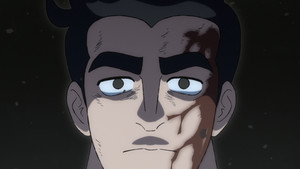Ranking of Kings: The Treasure Chest of Courage
Episode 4
by Lynzee Loveridge,
How would you rate episode 4 of
Ranking of Kings: The Treasure Chest of Courage ?
Community score: 4.4

I've made it no secret that the Underworld princes are my favorite secondary characters in Ranking of Kings. Favoritism aside, this is a perfect 22 minutes of television. "Immortality and Three Brothers" revisits some of the most shocking moments of Despa, Desha, and Ouken's fraught relationships, from confronting the homicidal madness of their father to Ouken tragically falling into step with his progenitor. Not all of this information is new (some of the sequences here even appear to be reused from the original series), but it's the first time we've seen it through Ouken's eyes. The narrative also does a stellar job of building on the brothers' differences and how these differences inform their individual relationships.
Desha has long had a complex about his appearance and how much he resembles his father. He and Desha were considered "failures" insomuch as Satun's experiments didn't imbue them with immortality. Desha's actions often appear to lack empathy, even in the face of the horrors of war, but the truth is that he's internalized his responsibilities as the heir so thoroughly that he does not allow himself to display his vulnerability publicly. In truth, his father's actions, the mercenaries, and eventually Ouken's slaughter deeply pain him. Despa, while not hindered by his visual resemblance to his father, still houses insecurity due to his lack of battle prowess. He makes up for this through strategic thinking, cunning, and a solid moral compass. It was only a matter of time before Despa's view on necessary evils would put the two brothers at odds.
Ouken's story invokes pity more than anything else. Arguably, his plotline edges too close to Daida's own in execution; both hinges on a father seeking to evade death to continue their quest for power, and both sons lose their sense of agency as a result. Daida's is, fortunately, temporary and doesn't result in the young king regressing into a blood-sucking murderer. Ouken's fall is so lamentable because it is partly rooted in his own naivety. He was willing to be Despa's "yes man," even if that meant perpetuating war throughout the kingdom. He slaughtered Gigantes with little thought and first saw his newly discovered immortality as a way to be more efficient in carrying out war campaigns. He was handsome and durable in battle, but there is little evidence that Ouken thought about much beyond what he was told.
Think of these events in contrast. As the brothers move together to defeat their father, Ouken promises to create a kinder Underworld Guard so that the events of the war do not repeat themselves. Yet, when Desha is seated firmly on the throne, Ouken, spurred by uncontrollable war lust, disassociates as he continually thrusts his sword into the head of a dead Gigantes. He fails to live up to his promise, so much so that when he is entirely consumed by madness, he slaughters his own troops. The in-universe explanation for Ouken's transformation is familial corruption. The circumstances of his birth, and his father's manipulation of dark rituals, corrupted Ouken so that even when he willed his father's presence out of his body, he still became a blood-thirsty soldier fixated on observing death.
Ouken's story could be ascribed to magic, but it's closer to the truth that his own actions corrupted his spirit and awoke something that was always there. Symbolically, this appears as his father's face, and Ouken begins to see him everywhere. Is this but a symptom of the circumstances of his birth, or has Ouken aligned himself with Satun in his willingness to continue killing in his kingdom's name?
“Never think that war, no matter how necessary, nor how justified, is not a crime.”
Rating:
Ranking of Kings: The Treasure Chest of Courage is currently streaming on Crunchyroll.
Disclosure: Kadokawa World Entertainment (KWE), a wholly owned subsidiary of Kadokawa Corporation, is the majority owner of Anime News Network, LLC. One or more of the companies mentioned in this article are part of the Kadokawa Group of Companies.
discuss this in the forum (3 posts) |
back to Ranking of Kings: The Treasure Chest of Courage
Episode Review homepage / archives